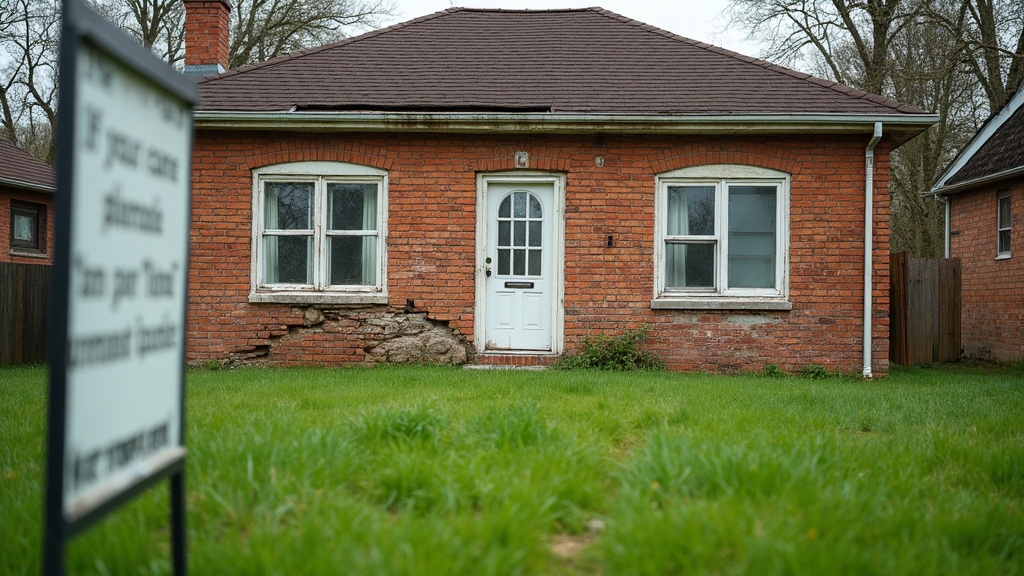Selling a house with foundation issues is a complicated process. Homeowners often worry about losing value or facing legal trouble. Many fear that hidden problems could lead to costly mistakes or canceled sales.
Foundation problems make buyers nervous and can attract legal risks. If you do not follow the rules, you could face lawsuits. Disclosure laws are strict, and missing details may cause deals to fall through.
To protect yourself, always follow legal requirements and disclose all known foundation issues before selling your house. By taking the right steps, you can avoid legal problems and build trust with buyers. This blog will show you how to manage foundation issues and protect your interests while selling your home.
Key Takeaways
- Sellers must legally disclose all known foundation issues and past repairs to buyers before closing.
- Failure to disclose foundation defects can result in lawsuits, canceled sales, or financial penalties.
- State and local laws require specific disclosure forms and documentation related to foundation problems.
- Selling “as is” does not remove the obligation to disclose major structural defects under the law.
- Pre-listing inspections and repair records help demonstrate transparency and reduce legal risks during the sale.
Understanding Foundation Issues and Their Impact on Property Value

Foundation issues can lower your home’s value and weaken its structure. These problems make it harder to sell your property. Many buyers see foundation damage as a big risk. Proper assessment of foundation problems is essential, as stepped-up basis established at inheritance can influence the tax implications if you sell the property later. Common signs of foundation settlement include cracked walls, uneven floors, and doors that stick.
These signs mean the foundation may not be strong enough. If left unfixed, the damage can get worse. A professional should check the foundation to find out how bad the problem is. If you fix the issues early, you can avoid bigger repairs. Honest repairs and clear information can help you keep your home’s value when selling. Understanding foundation issues can also help you identify potential problems early and make informed decisions.
State and Local Disclosure Laws Explained
State and local disclosure laws tell you what you must share with buyers. These laws are different in each area. Sellers must give honest information about a home’s condition.
Most laws require you to reveal known foundation problems. This includes cracks, shifting, or other major issues. Buyers need to know about these before buying. Foundation issues can significantly impact the value and safety of a property. Sellers must disclose any known foundation issues—like cracks or shifting—so buyers can make informed decisions before purchasing.
Some laws also cover environmental hazards. You may need to report soil contamination or if the home is in a flood zone. Always check your local rules. Environmental disclosures are vital to protect buyers from potential health risks.
Zoning restrictions can affect how a property is used. If your home has zoning limits or upcoming changes, you must tell buyers. Not sharing this can cause problems later. Understanding zoning laws helps prevent future legal disputes.
In addition to physical issues, a clear title is essential to ensure there are no legal encumbrances or disputes that could delay or block the sale. If you follow these rules, you protect yourself from future disputes. Honest disclosure keeps the selling process fair. Always check your state and local laws for details. When in doubt, consulting with a real estate professional can help ensure full compliance.
Required Seller Disclosure Forms and Documents

To meet legal requirements as a seller, fill out all required disclosure forms. Each state and local area has its own rules. These forms ask for details about your property’s condition. If you know about foundation issues or past repairs, share that information. Provide copies of inspection reports and receipts for repairs. If there are any environmental problems, include related documents.
Always use the official forms from your agent or local office. If you skip details or give wrong information, you could face legal trouble. Organized documents help buyers trust your sale and make the process smoother. Additionally, being aware of the guaranteed sale process employed by some buyers can help you navigate potential hurdles more confidently. Understanding the disclosure obligations associated with your property can also prevent future legal complications.
Identifying What Must Be Disclosed to Buyers
You need to understand your state’s disclosure requirements, as they determine exactly what information about foundation issues you’re legally required to share. You must also disclose any material defects that could affect the property’s value or safety. Since local laws can vary, always check for specific regulations in your area to ensure full compliance.
Additionally, addressing property appeal strategies such as repairs and updates can influence how issues are perceived during the sale process. Understanding the role of property disclosure laws helps ensure that you provide full transparency and avoid potential legal disputes.
State Disclosure Requirements
State disclosure requirements are important because you must tell buyers about known foundation problems. Each state has its own rules about what you must share. If you do not follow these rules, you could face lawsuits or the cancellation of your sale.
Most states require you to fill out specific disclosure forms about the home’s condition. These forms often ask about any foundation repairs or changes. Some states want detailed information about past renovations that could hide issues.
You usually need to give these disclosures before or during the contract stage. It is not enough to mention problems after you have marketed or staged the home. If you follow your state’s laws, you reduce the risk of legal trouble and delays.
Material Defect Obligations
Sellers must disclose material defects that impact a property’s value or safety. This includes foundation problems or any serious structural issues. If an inspection found foundation concerns, you must share these results with buyers.
Insurance claims for foundation repairs are also material facts. Buyers need to know about any past claims or repairs on the home. If you hide these issues, you could face legal trouble or lose the sale.
Keep all inspection reports, repair estimates, and contractor communications. Good records help prove you met your disclosure duties. Honest disclosure builds trust and can make selling your home easier.
Local Law Variations
Local laws about foundation disclosures vary widely across states. Each state can have different rules for what sellers must tell buyers. You must check your local laws before listing your home.
Some states require you to report any foundation repairs done in the past. Others only require you to mention current visible problems. Always find out what details you are legally required to share.
If your area needs a special disclosure form, you must use it. If you fail to disclose what’s needed, you could face fines or lawsuits. Knowing your exact obligations helps you avoid legal trouble.
The Role of Home Inspections in the Sales Process
A home inspection is important when selling a house with foundation problems. It helps reveal any hidden issues and sets expectations for buyers. If you get an inspection before listing, you show honesty and build buyer trust.
The inspection report gives clear facts about the house’s condition. Sellers can use this report to answer questions and make required disclosures. If buyers see a thorough inspection, they may feel more confident about the purchase.
Sellers should hire a licensed inspector and be present during the inspection. Reviewing the findings helps sellers understand what needs fixing. If the report uncovers issues, sellers can address them or adjust the price.
Written documentation of problems is needed for legal and ethical reasons. If there are concerns, both parties can use the report during negotiations. This process helps buyers make informed decisions and offers based on real information.
Additionally, understanding home inspection procedures and standards in your area can prevent future legal complications and ensure compliance with local regulations. Recognizing the importance of proper disclosure requirements ensures transparency and helps avoid potential legal issues later on.
Repair Obligations Before Listing Your Property

If your home has foundation problems, you may need to fix them before selling. Laws and buyer expectations often require repairs. Check requirements in your area before listing. Having a clear understanding of your state’s disclosure laws can prevent potential legal issues down the line.
First, review your homeowner’s insurance policy for coverage of foundation repairs. Insurance may pay for some or all of the costs. Knowing this helps you plan your next steps. Check your homeowner’s insurance—some policies may cover foundation repairs, saving you money and helping you plan your next steps.
Next, schedule a professional inspection to assess the damage. A written inspection report shows what needs fixing. This report can guide your decisions and reduce surprises.
Then, consult a licensed contractor for repair estimates and timelines. If repairs are needed, knowing the cost helps you budget. You can decide to fix issues or disclose them to buyers.
Additionally, understanding how foundation issues impact your property’s value and marketability can help you make informed decisions about repairs or disclosures.
Taking these steps protects you from legal problems. Honest repairs and disclosures can also help buyers feel more confident. This approach makes the selling process smoother for everyone.
Selling “As Is”: Pros, Cons, and Legal Requirements
Selling a home “as is” means you are selling it without making any repairs. This option saves time and money for the seller. Many buyers who are investors look for “as is” properties.
Homeowners may get lower offers because buyers expect to pay for repairs. Sellers must clearly state “as is” in the sales contract. This avoids confusion when transferring the property title.
If you are selling “as is,” you may still need to fill out legal forms or disclosures. Local laws often require certain paperwork, even for “as is” sales. A real estate attorney can help you meet all legal rules and protect your interests.
Understanding legal disclosure requirements is crucial to ensure compliance and avoid future legal disputes. Additionally, accurately assessing property condition helps in setting correct expectations and avoiding legal issues later on.
Potential Liability for Non-Disclosure
If you do not disclose known problems with the house, you could be held responsible. Selling a house “as is” does not protect you from the law. Buyers must know about major issues like foundation problems before buying. Additionally, swift transactions can help ensure that disclosures are made promptly, reducing the risk of legal complications.
If you hide important facts, buyers might take you to court. Courts could order you to pay for repairs or return the money. Sometimes, the sale can even be canceled.
Complete honesty about any known issues is always the safest choice. If you are not sure what to disclose, ask a real estate professional. Being clear protects you from future legal trouble.
Negotiating Repairs or Price Reductions With Buyers
When negotiating with buyers, you need to clearly disclose any structural defects and decide whether to handle repairs yourself or offer a price reduction. Weigh each option carefully, as buyers may face financing challenges if major foundation issues remain unresolved. By addressing these concerns directly, you can streamline the sale and minimize potential setbacks.
Disclosing Structural Defects
You must tell buyers about any known structural defects. Foundation problems can lower property value and affect safety. The law requires full disclosure to protect everyone involved.
If you have had inspections or repairs, list them in your disclosure documents. Buyers need this information to make informed decisions. Being open prevents legal problems later.
Keep copies of all inspection and repair records. Fill out disclosure forms with honest and accurate details. If a buyer asks questions, provide clear answers and share any relevant reports.
Repair Versus Discount Options
After disclosing your home’s foundation problems, you must decide how to deal with them. You can fix the issues before selling or offer a lower price. Both options have pros and cons.
If you repair the foundation, always hire licensed contractors. Get written estimates and keep all repair records. This can help keep your asking price firm.
If you offer a discount instead, show buyers repair quotes to explain the price drop. Let the buyers handle repairs after buying. Always communicate clearly and share all repair details.
Good documentation helps avoid confusion. If you do either option, be honest with buyers. Clear records make negotiations smoother.
Buyer Financing Challenges
Many buyers struggle to get loans for homes with foundation issues. Lenders often refuse financing until these problems are fixed. This can make selling your home harder.
If this happens, you may need to negotiate with buyers. You might offer a lower price or agree to make repairs. These steps can help keep the sale moving.
A professional structural assessment can show the full extent of the problem. This report helps set a fair price for your home. It also gives buyers and lenders clear information.
If buyers still want the home, you can work together on solutions. For example, you could finish major repairs before closing. Another option is to set up an escrow account for future repairs.
Taking these steps can help you overcome financing challenges. This makes it more likely to close the sale.
Working With Real Estate Agents and Legal Professionals
Working with real estate agents and legal professionals helps you handle foundation issues when selling a house. They guide you through legal requirements and help lower your risks. Their support makes the home-selling process easier and safer.
A skilled agent can set a fair price and explain any problems to buyers. They help market your home and answer buyer questions clearly. If you have liens or other property issues, agents can help uncover them.
Legal professionals check that your disclosures follow state rules. They make sure you share all important information about the foundation. This reduces future legal trouble if problems come up after the sale.
If you rely on these experts, you can fix issues early and meet your obligations. Their advice adds confidence to your negotiations. This approach protects your interests and supports a smooth sale.
Impact of Foundation Problems on Mortgage and Financing
When your home has foundation issues, lenders may tighten their requirements or even deny mortgage approval entirely. Appraisers will likely note these problems, which can lower your property’s value and impact a buyer’s ability to secure financing. To keep your sale on track, address foundation concerns early and prepare documentation for lenders and appraisers.
Lender Requirements for Approval
Lenders are careful with homes that have foundation problems. They need proof that the house is safe before they approve a loan. Sellers must meet these requirements to keep the sale on track.
Lenders usually ask for records of any foundation repairs. If repairs are done, sellers should provide documents from a licensed contractor. Banks may not approve the loan without this proof.
Most lenders want a recent inspection report. This report should explain what the problem is and whether it is fixed. If the issue remains, lenders may delay or deny the loan.
In some cases, lenders tell buyers to negotiate repairs before closing. They may require money for repairs to be set aside in an escrow account. If these steps are not followed, loan approval could be at risk.
Appraisal Challenges and Outcomes
Appraisal challenges often occur when a home has foundation problems. Appraisers lower a home’s value if they see cracks or uneven floors. If this happens, buyers may not get full mortgage funding.
Lenders may also require repairs before approving a loan. Sellers should fix foundation issues before listing the home. A professional inspection and repair records can support a better appraisal.
If you get a pre-listing appraisal, you can spot problems early. These steps help you avoid delays during the sale. Proper preparation increases your chances of a smooth transaction.
Handling Offers From Investors and Cash Buyers
If your house has foundation problems, most offers will come from investors or cash buyers. These buyers look for homes that need repairs. They can close deals quickly because they do not need loans.
Investors usually want their own inspections, even if you share all known issues. Inspection results may affect their final offer. Some buyers may ask for price changes after inspections.
Investors often offer less money because they plan to fix the problems. Their offers reflect the repair costs and risks they take. Sellers should not expect full market value.
Always read contracts carefully before agreeing to any offer. Check for details about contingencies and proof of funds. If you are unsure, consider asking a real estate agent for advice.
Documenting All Repairs and Communications
Keeping records of all repairs and communications is very important when selling a house with foundation issues. These documents show what steps you have taken to fix problems. They also help prove your honesty to potential buyers.
You should save repair invoices, contractor reports, and all messages with professionals. Emails, texts, and agreements with buyers or agents should be stored safely. These records show what information was shared and when.
If you file insurance claims for repairs, keep the forms and company responses. Organized paperwork helps answer questions from buyers. Good records can also protect you if someone questions the home’s condition later.
Preparing for Possible Legal Disputes Post-Sale
You need to keep thorough records of all disclosure communications with the buyer to protect yourself if legal issues arise. Make sure you fully understand your state’s disclosure laws, as requirements vary and missing a step can expose you to liability. If you’re concerned about possible disputes, secure legal representation early to safeguard your interests throughout the process.
Documenting Disclosure Communications
You should always keep records of all disclosure communications. This protects you if there is a problem later. Documentation is as important as the disclosure itself.
Sellers need to keep copies of all written disclosures. These can include emails, letters, and signed forms. Organized records are easier to find if needed.
If you have verbal talks with buyers, write down the dates and main points. Notes about phone calls or meetings help create a clear record. These notes should be kept with your other documents.
Inspection reports and repair estimates should also be saved. Attach these to your other disclosure files. Such documents can give extra proof if questions come up.
Proper records help you meet your seller duties. If a legal issue comes up, clear records are your best defense. Being careful now can prevent trouble later.
Understanding State Disclosure Laws
State disclosure laws are different in every state. You must know your legal duties before selling a house with foundation problems. Some states require sellers to report all known issues, while others only ask for answers to direct questions.
Buyers and title insurance companies check if you followed disclosure rules. If you do not disclose properly, you risk denied insurance claims or lawsuits. Reviewing your state’s forms and laws helps you follow the rules and avoid problems.
For example, State A requires sellers to share all known problems, including foundation or environmental issues. State B only makes sellers answer direct questions from buyers. Buyers in State A have more legal protection if a seller does not disclose problems.
Accurate disclosures protect sellers and buyers. If you stay honest, you can prevent legal trouble after the sale. This approach also leads to a smoother selling process.
Securing Legal Representation
Securing legal representation helps you handle legal issues after selling a house with foundation problems. An attorney protects your rights if any disputes arise. Legal help is important for addressing claims you might face from buyers.
A lawyer reviews your disclosure documents to check if you followed state laws. They can answer buyer complaints or legal notices about foundation or property issues. If needed, an attorney can help you settle disagreements or represent you in court.
If buyers claim you did not disclose property tax or safety issues, a lawyer can defend your position. Legal support helps you solve problems quickly and with less stress. If you want to avoid extra costs or future problems, consider hiring a real estate attorney.
Conclusion
If you need to sell a house with foundation issues, full disclosure is not optional. Sellers must inform buyers about known problems to avoid legal trouble. If you are honest and provide all documentation, you can avoid future disputes.
If you want a simple sale, you might consider selling to a cash buyer. We buy houses for cash, even if they have foundation issues. This option can save you time, money, and stress.
If you want to skip repairs and open houses, we at Limitless Homes of KC are here to help. Contact us today for a no-obligation cash offer. Let us make selling your home easier and worry-free.

